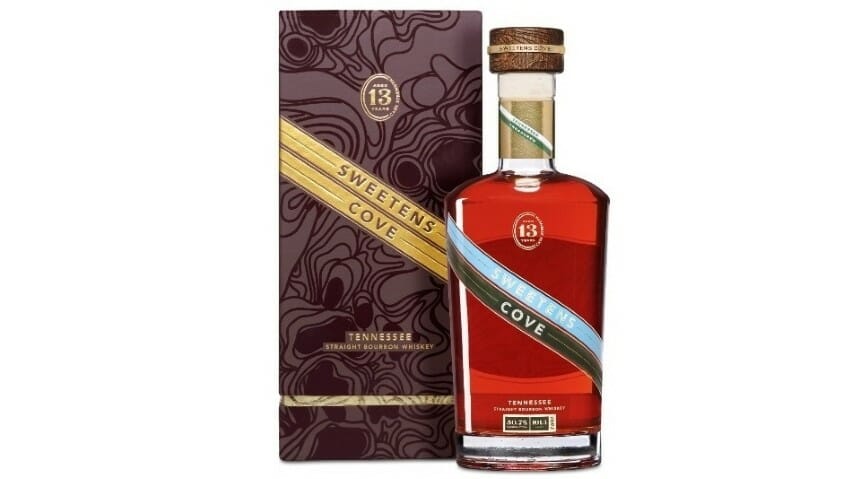Sweetens Cove Tennessee Bourbon
Photos via Sweetens Cove
Determining value within the world of limited edition whiskey releases can be a tricky proposition. On a baseline level, you have the fundamental data points with which to form an expectation. What distillery is the release from? What’s its age statement? What’s the proof? Exactly how limited is it? And so on.
Those specs can give you a starting point, but they can’t tell the whole story. A whiskey with similar specs to another may still be able to inflate its prestige (and MSRP) through marketing, or ownership, or the talent involved in blending or secondary maturation. That whiskey may simply be better than its fundamentally similar competition, which of course begs the question of “How much better does it need to be in order to justify a significantly higher price?”
These are not easy questions to answer, but reasoning your way through them is sort of inevitable when you approach Sweetens Cove Tennessee Bourbon. This is a well-aged Tennessee bourbon almost certainly sourced from the mecca of Volunteer State whiskey, George Dickel. But at a $200 MSRP, it’s far more expensive than other well-aged Dickel whiskey on the market, which naturally makes a customer wonder why. And the answer comes down to a combination of marketing and the eye-catching names involved.
Sweetens Cove is a new brand formed by a team of investors that includes sports legends Peyton Manning and Andy Roddick. Named for a golf course outside of Chattanooga that was acquired by those investors, it sought to legitimize itself as a premium product right out of the gate by bringing in a master blender who has received a lot of attention in whiskey circles: Marianne Eaves. Eaves, the state of Kentucky’s first female master distiller, turned heads when she became the head of the distilling program at the revived Castle & Key distillery a few years ago, but she ultimately departed from the brand before it ever released its first official whiskey—that release is coming soon, in the form of Castle & Key Restoration Rye. Eaves instead turned her attention toward whiskey consultation and blending (she also created a whiskey subscription service, Eaves Blind ), with Sweetens Cove as perhaps her most high-profile client. Her presence guaranteed that “in the know” whiskey people would be paying attention the product coming from Sweetens Cove.
That product was created by Eaves from 100 barrels of Dickel whiskey, at least 13 years in age. She then blended those barrels into five distinct batches, which have been released at cask strength throughout 2020, although it should be noted that the “cask strength” here is very low, ranging from around 100-103 proof. This perhaps suggests the majority of the barrels were drawn from low in the rickhouses, where lower temperatures and higher humidity tend to result in barrels dropping in proof while aging, rather than rising. The product is labeled as “Tennessee bourbon” despite the fact that it’s presumably gone through the “Lincoln County Process” of charcoal filtration—illustrative of the fact that Tennessee whiskeys such as Dickel can legally be defined as “bourbon,” but simply choose not to use that word most of the time.
Overall, the batch size is around 14,000 total bottles, although the bottles are rather opaquely not labeled with batch numbers—consumers must instead look up the proof numbers of each batch and match them to the bottles if they want to know which batch they’ve located. Additionally, Sweetens Cove is also preparing a special release called “The Foursome,” which represents four of the 100 original barrels Eaves was working with, which she set aside for an ultra-limited set of single barrel releases.
Now, some whiskey geeks took offense to the price tag on Sweetens Cove, which clocked in at $200—pretty high for any bourbon, although not outside the realm of reality for a 13-year-old, cask strength product. However, the offense here was made more pronounced by the existence of George Dickel’s own Bottled-in-Bond, which has put out two 100 proof batches at 13 and 11 years old, for $40 or less. That’s a huge difference in the asking price on two products that, going by the specs alone, are very similar.
The question to answer, then, is “How does Sweetens Cove compare to Dickel Bottled-in-Bond?” Can it justify itself as a premium product that is existing on a different level of quality from the high value represented by Dickel’s product?
-

-

-

-

-

-

-

-

-

-

-

-

-

-

-

-

-

-

-

-

-

-

-

-

-

-

-

-

-

-

-

-

-

-

-

-

-

-

-

-








































